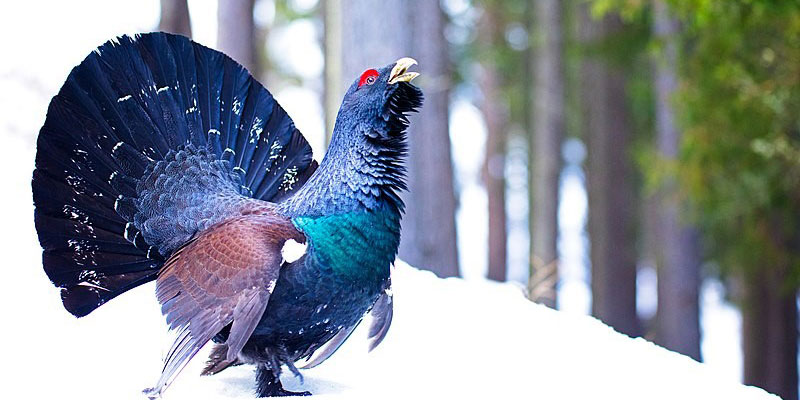
LASPEH Project is developing a transnational common strategy to preserve common habitats and species in Italy, Albania and Montenegro. But what are they? Here is an insight on Tetrao Urogallos in the National Park “Tomorri Mountain” (Albania).
Western Capercaillie (Tetrao Urogallus) is a species threatened by extinction living few in number in the dense forests of coniferous in Europe from the Scandinavian countries to the Mediterranean ones. Tetrao Urogallos belongs to the pheasant family (Phasianidae). The male is about 90 cm long with a weight of 3.5-5 kg while the female is smaller, about 60 cm long with a weight of 2.5-3.5 kg. The body feathers of the male are dark and shiny while those of female are chestnut.
In Albania, this rare bird grows in the Northern and Central mountainous areas, in particular in the National Park “Tomorr Mountain”. Thanks to LASPEH, concrete actions will be implemented in order to improve the level of protection of Tetrao Urogallus and its habitat. First, the afforestation of the Albanian territories involved: Mali Tomor, Dardhë and Kapinov (the natural “home” of Tetrao Urogallus). As a matter of fact, in this area, the number of these animals has decreased massively during the last 20 years and only after a hunting moratorium, the presence of this species restarted growing. In particular, in the National Park “Mali i Tomorrit” a population of Tetrao Urogallos suitable for repopulation was identified: during the territorial monitoring, their crowing was heard but they have not been photographed yet.
These habitats of great naturalistic and landscape value are involved in the Project LASPEH, which aims at defining a common strategy to preserve the natural and landscape heritage of the Low-Adriatic area (in particular in Italy, Albania and Montenegro) in order to face the loss of biodiversity. Particular attention will be given to species protected by directives 92/43/CEE and 79/409/ CEE, typical of these eco-regions threatened by changing environmental conditions, caused by climate changes and bad management.
LASPEH Project, funded by the Interreg IPA CBC Italy-Albania-Montenegro Programme under the Priority Axis 3 (Environment protection, risk management and low carbon strategy) of the Programme, will implement a network of organisations cooperating for a better management of priority species in Natura 2000 sites, exchanging their best practices and developing a transnational common strategy to preserve common habitats and species.
Image credits: StelvioPark. No changes made. CC https://creativecommons.org/licenses/by-sa/4.0/

